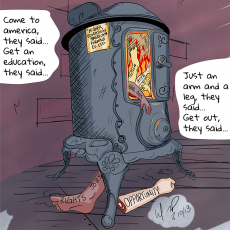| October 16, 2019 | Editorial |
|---|

When international students decide to come to the U.S., they already silently agree to pay more money to be treated differently.
According to The Institute of International Education, international students paid $42.4 billion to the U.S. economy for tuition and other expenses in 2017.
However, they do not receive the same experience compared to U.S. citizens.
Under the law, their parents must fully cover their tuition, students cannot go to work unless the school operates the workplace, and they are limited to working 19.5 hours a week.
International students pay a much higher tuition rate for each credit in public colleges. In the fall, an international student paid TCC $305 for one credit hour, five times more than an average student. A typical three-credit-hour class costs $915.
There are many reasons for the difference between an average student’s cost and what an international student pays. Citizens already pay their taxes to fund public colleges, so international students must pay extra, which seems fair.
Although they pay up to five-times the amount compared to a domestic student, international students still are not treated as equals.
According to The New York Times, denials and delays of international students’ visa applications have become much more common. Many of them were under administrative processing, which means an extra security background check to delay their visa process.
For some international students, the administrative processing would happen even when they applied to renew their visas. In some cases, students have been denied their visas after already studying at a high school or university. This means just because a student went to a U.S. college in 2018 does not mean they will do so in 2019.
Also, The Times reported that extending processing time is more common to Asian students. Since Donald Trump became president, he has promised to prioritize giving jobs to Americans as opposed to international students.
Trump seems to think this would prevent espionage by students from China and India.
He does not want a college to be filled with Asian students whom the government believes would go back to the country once they have finished their studies.
But the government also chooses to limit the number of international students who can stay after studying.
If international students apply to STEM programs, they will be granted 90 days to find a job after graduating. Non-STEM students have 30 days to find a job. If these students cannot find a company from a limited list that can sponsor them, they must leave the country immediately.
Despite discriminating against international students for fear of them taking their advanced skills learned in the U.S. back to their hometown, the government does not give these students enough opportunities for them to stay and return what they have learned from an American education.
If an international student shows enough documentation to prove they are living in the country legally, they should be able to vote during elections.
International students and domestic students receive the same education. Sadly, the government has decided to treat them differently. Something needs to be done, but unfortunately, it will take a long time for positive changes to happen.
































